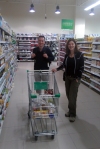More oryx, fewer rodents and efforts for wolves in the Dubai Desert Conservation Reserve
Twelve expedition team members from four different countries in January 2016 participated in a Biosphere Expeditions conservation project to evaluate the oryx and gazelle population in the Dubai Desert Conservation reserve in the United Arab Emirates. The research work also involved setting live traps to capture the endangered sand fox and Gordon’s wildcat. Rodents were also captured in small mammal traps.
The data gleaned in this way will now be analysed by the local scientist, Stephen Bell, who will soon be releasing a report detailing the outcome of the 2016 expedition. He explains that “we captured only few rodents and this could be a reason for the absence of the desert eagle owl, which was not spotted over the week, as well as the wildcat.”
130 fox dens were also checked and several new dens logged. This high number of Arabian red fox could be “detrimental to the balance of the reserve’s ecosystem”, according to Bell.
39 of 42 observation cells (an area of 2 by 2 kilometres) were surveyed in the course of the week throughout the 227 km² reserve. Expeditioners navigated to their cells in the desert by 4×4 and then walked to elevated points to count the animals they could sport with binoculars and spotting scopes. That way over 400 oryx, almost 140 mountain gazelle, around 50 sand gazelle and two hares were counted over the course of the week. The rare lappet-faced vulture was spotted on several occasions and in great numbers when a fresh carcass was found.
Since starting its partnership with the Dubai Desert Conservation Reserve (DDCR) in 2012, Biosphere Expeditions has made several important contributions to the management of the reserve and its rare species. Initially expedition work prompted the DDCR to change oryx feeding patterns, resulting in a much healthier population. Rare Gordon’s wildcats and a very rare and elusive sand fox were captured by the expeditions over the years, prompting the reserve to increase research and conservation efforts for these threatened species. Finally, data gathered by the expeditions showed that the introduction of the Arabian wolf would be beneficial. The UAE government accepted these arguments and the DDCR is now investigating processes and options to make what will be a major showcase conservation success story for Arabia become reality.















































































